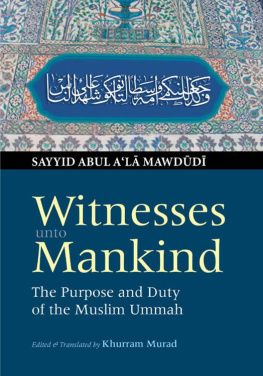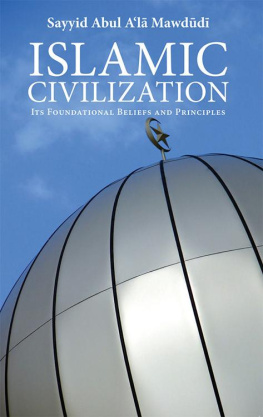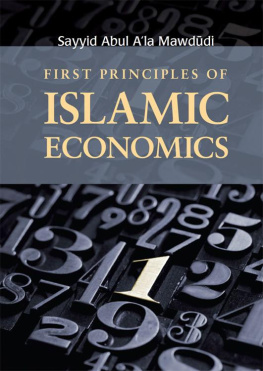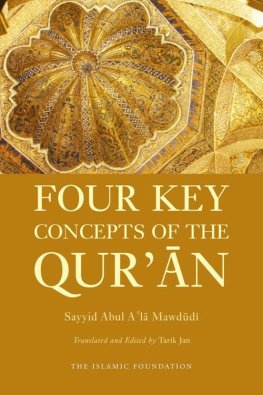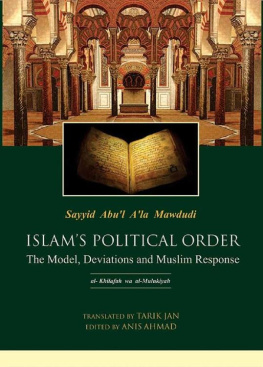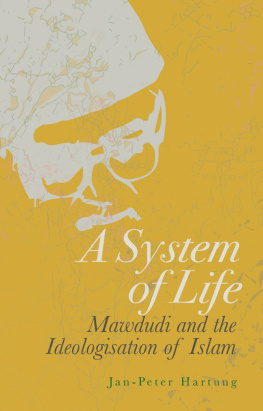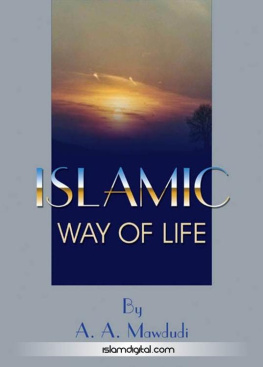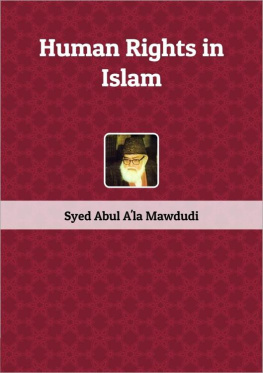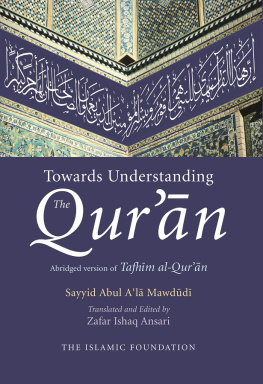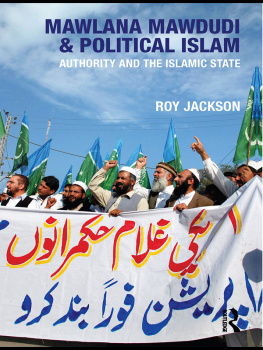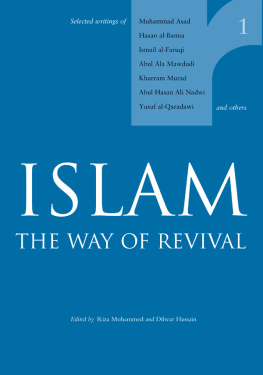Sayyid Abul Ala Mawdudi - Witnesses unto Mankind
Here you can read online Sayyid Abul Ala Mawdudi - Witnesses unto Mankind full text of the book (entire story) in english for free. Download pdf and epub, get meaning, cover and reviews about this ebook. year: 2015, publisher: Kube Publishing Ltd, genre: Religion. Description of the work, (preface) as well as reviews are available. Best literature library LitArk.com created for fans of good reading and offers a wide selection of genres:
Romance novel
Science fiction
Adventure
Detective
Science
History
Home and family
Prose
Art
Politics
Computer
Non-fiction
Religion
Business
Children
Humor
Choose a favorite category and find really read worthwhile books. Enjoy immersion in the world of imagination, feel the emotions of the characters or learn something new for yourself, make an fascinating discovery.
- Book:Witnesses unto Mankind
- Author:
- Publisher:Kube Publishing Ltd
- Genre:
- Year:2015
- Rating:4 / 5
- Favourites:Add to favourites
- Your mark:
- 80
- 1
- 2
- 3
- 4
- 5
Witnesses unto Mankind: summary, description and annotation
We offer to read an annotation, description, summary or preface (depends on what the author of the book "Witnesses unto Mankind" wrote himself). If you haven't found the necessary information about the book — write in the comments, we will try to find it.
Witnesses unto Mankind — read online for free the complete book (whole text) full work
Below is the text of the book, divided by pages. System saving the place of the last page read, allows you to conveniently read the book "Witnesses unto Mankind" online for free, without having to search again every time where you left off. Put a bookmark, and you can go to the page where you finished reading at any time.
Font size:
Interval:
Bookmark:
Sayyid Abul Ala Mawdudi
WITNESSES
UNTO
MANKIND
The Purpose and Duty of
the Muslim Ummah
Edited & Translated by
Khurram Murad

The Islamic Foundation 1986/1406 AH. Reprinted 1994/1415 AH.
ISBN 978-0-86037-172-4 (PB)
ISBN 978-0-86037-173-1 (HB)
All rights reserved. No part of this publication may be reproduced, stored in a retrieval system, or transmitted in any form or by any means, electronic, mechanical, photocopying, recording or otherwise, without the prior permission of the copyright owner.
Editor: Khurram Murad
Cover design: Rashid Rahman
Published by
The Islamic Foundation
Markfield Dawah Centre
Ratby Lane, Markfield
Leicester LE67 9RN, UK
Quran House, PO Box 30611,
Nairobi, Kenya
PMB 3193,
Kano, Nigeria
New and edited English translation of the Urdu Shahdat aq (Lahore, 1947), which has previously been translated and published as the Evidence of Truth (Lahore, 1967).
British Library Cataloguing in Publication Data
Mawdd, Sayyid Abl Ala
Witnesses unto mankind: the purpose and
duty of the Muslim ummah.
1. Islam
I. Title II. Murad, Khurram
III. Shahdat aq. English
297 BP161.2
ISBN 978-0-86037-173-1
ISBN 978-0-86037-172-4 Pb
Printed and bound by CPI Group (UK) Ltd, Croydon, CR0 4YY

In the Name of God,
the Most Gracious, the Most Merciful
O believers, bow down and prostrate yourselves, and serve only your Lord, and do good, so that you might attain well-being. And struggle in the way of God as ought to be struggled in His way. He has chosen you, and He has not laid on you in your Din any constriction. Follow the way of your father, Abraham. He has named you Muslims, before and in this, so that the Messenger would be a witness before you, and you would be witnesses before all mankind. So establish the Prayer, give the Alms, and hold fast unto God. He is your Master. How excellent the Master, and how excellent the Helper.
(al-ajj 22: 778)
Contents
Published immediately afterwards, Shahdat aq has since been reprinted many times, both separately and as a part of a larger collection of Sayyid Mawdudis works, Islam k Nim Zindig (Lahore, 1962), by commercial publishers and by friends and admirers who desired to disseminate its important message on a larger scale. It has also been translated into several languages, the first English translation appearing under the title the Evidence of Truth (Lahore, 1967). Now, this entirely new and more extended English version is being published by the Islamic Foundation.
The message and substance of Sayyid Mawdudis address is of fundamental importance both to Muslims and to mankind at large, as the English title adopted by me shows. Put simply: Muslims, who now constitute one-fifth of the human race, have no other justification to exist as a community but that they should bear witness, before mankind, to the Truth and guidance which God has given them. For this very purpose, he explains, God sent all the Prophets. They showed man the right way of life, the path of his Creator, so that he could live by it and not plead ignorance when called to account on the Day of Judgement. After the Last Prophet, blessings and peace be on him, it is Muslims who must fulfil this prophetic mission to all mankind and for all times to come.
Describing how this witness must be given, both by words and deeds, Sayyid Mawdudi proceeds to depict how the Muslims words and deeds have in fact become witnesses against Islam. Their failure to do their duty and, instead, giving false witness, he holds, is the sole cause of their present state of ignominy and backwardness. Later, he also explains that the Jamaat Islami was formed precisely to do this duty and invite all Muslims to it. Finally, he answers certain objections which were then being raised against the Jamaat Islami.
His style, as usual, possesses all the directness and clarity, the passionate lucidity, and the persuasive logic, so characteristic of him. Because of its message and style, this brief booklet has made a deep impact on its readers, and stirred many people to renew their commitment to Allah and come forward to fulfil their covenant with Him.
Though delivered about four decades ago in a party conference, Sayyid Mawdudis message is universal and timeless. The need to hear it remains as great as ever. But the presently available English translation retains little of the charm and power that characterize the original Urdu work. Hence it has not been able to penetrate the hearts and minds of English readers as it should have. The need for a better English translation was, therefore, great. English is now spoken by millions of Muslims, who can all benefit immensely from an improved English version. I hope that this new translation will bring them, in some degree, nearer to the life and power that fill Sayyid Mawdudis original words.
The editorial work, in addition to contributing an introduction and notes containing Quranic references, has been confined to providing necessary headings and sub-headings, incorporating certain footnotes in the text, and removing the last part, dealing with the objections against the Jamaat Islami, to an appendix at the end of the book.
The extensive references from the Qurn that I have provided should prove an important addition. What need do they fulfil? Firstly, the Qurn is the source of Sayyid Mawdudis message and argument. Hence these notes should help the reader to discover how both are linked. Secondly, as I have written elsewhere, I expect that this work will continue to be used, as it has been so far, by the generations of Muslims who are ardently striving to make their lives Islamic. In many groups, study circles, classes and organizations around the world, it will be eagerly taken up as a basic text. It is most essential, however, that all studies on Islam are pursued, as far as possible, within the framework of the Qurn and Hadith. To these the Muslim youth, intelligentsia and scholars must turn again and again and draw closer and closer. I sincerely hope that my notes will serve as a means towards that end, and that they will encourage the reader into a more direct intimate relationship with the Qurn.
It is my earnest hope that this book will stir the hearts of its readers and inspire them to take up the challenge that Sayyid Mawdudi has placed before them. I also pray to Allah, subhanahu wataala, to bless this effort with His forgiveness, mercy and acceptance.
Leicester 16 December, 1985 3 Jumada l-Ula, 1406 | Khurram Murad |
The Jamaat Islami was formed as a result of Sayyid Mawdudis call, in Lahore, now in Pakistan, on 2 Shaban 1360/26 August, 1941, in a gathering of about 75 persons. Sayyid Mawdudi was elected its first Amir.
See my Introductions to his The Islamic Movement: Dynamics of Values, Power and Change (Leicester, 1984) and Let Us Be Muslims (Leicester, 1985).
Shahdah, of which witness is the English equivalent, is central to Islam. It is a fundamentally important key word in the Islamic vocabulary. It plays a crucial role in defining and shaping the Islamic life and discourse, a life and discourse which extends from the existential to the cosmic.
Witnessing, thus, lies at the heart of Islam, it constitutes the precincts of Islam. One can enter Islam only upon saying the Shahadah, one can remain in Islam only by saying and doing the Shahadah. It is the first word that a new-born Muslim baby hears, it is the first and foremost of the pillars of Islam on which he constructs and sustains the entire edifice of his Islamic life, it must be the last word on his lips as he departs from this world to meet his Maker. Five times a day it must be proclaimed to the world from minarets and rooftops wherever a Muslim might happen to be; still much more often it must be uttered in the deep silence of the heart. In between, every aspect of his life should be shaped by the Shahadah.
Next pageFont size:
Interval:
Bookmark:
Similar books «Witnesses unto Mankind»
Look at similar books to Witnesses unto Mankind. We have selected literature similar in name and meaning in the hope of providing readers with more options to find new, interesting, not yet read works.
Discussion, reviews of the book Witnesses unto Mankind and just readers' own opinions. Leave your comments, write what you think about the work, its meaning or the main characters. Specify what exactly you liked and what you didn't like, and why you think so.

